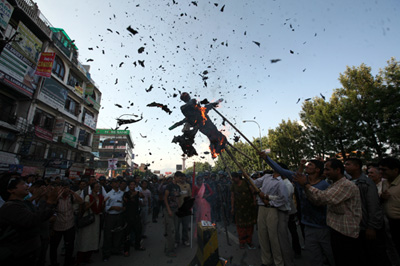 KIRAN PANDAY Protesters burn an effigy symbolising the Constituent Assembly in Baneswor, Kathmandu, on 28 May, 2010 |
On the night of 27 May, NC's Krishna Sitaula and Amresh Singh met Prachanda. They told him the PM would not resign the next day, and deserved an honourable exit. If the Maoists extended the CA and moved one step on the peace process, the NC would get the PM to resign in a few days. Prachanda did not buy that. The NC negotiators had a similar conversation with Dr Bhattarai the same night and early next morning, and also met the PM to assure him of full support.
On the final day, all top leaders were in the CA, but the core negotiators were Sitaula, Singh, Bhim Rawal and Krishna Bahadur Mahara. The Maoists first proposed that extension and resignation happen together: demand rejected. The Maoists then suggested that the PM could commit to 'resigning' in his speech, and privately agree to quit in two days. The other side said the PM would at best commit to 'opening the way' and the term 'resignation' would not figure in any agreement. Talks were stuck on this point through the day.
And then the UML cracked, with multiple voices demanding the PM could not hold the CA hostage. The revolt within was led by Bamdev Gautam, and younger MPs like Rabindra Adhikari. The Maoists were thrilled. Prachanda told a few aides that either the UML would blink or it would split if the PM did not resign.
Fissures within the NC had also started appearing. A few MPs even shouted at Sher Bahadur Deuba and Sitaula for not being flexible enough. Ram Chandra Poudel kept calling the PM to come to the CA, even as other NC negotiators told him to come only after a deal since he would be subject to tremendous pressure in the CA.
But the focus was clearly on the internal UML rift. The CA complex was abuzz with reports that 64 MPs had met the CA chairman, threatening to surround the well of the house and chant slogans against their own PM. Rumours circulated that they had decided to register a different party. Subash Nembang himself was angry with the PM, and had even advised him to quit a few days earlier. At this heated moment, towards late evening, KP Oli arrived in the house.
Oli realised the game had changed, and the fracture within was serious. Even his erstwhile supporters, like Bishnu Poudel and Pradeep Gyawali, angrily told him history would judge him and the UML very harshly if the CA ceased to exist. Oli could see that if they did not show some flexibility, the CA could be dissolved and the party could split. And if there was a deal of some sort, his rival Jhalnath Khanal would take all the credit and emerge stronger.
Even as NC leaders waited outside, Oli met Prachanda � on a one-on-one basis, and with Khanal. He asked what the Maoists wanted; Prachanda insisted on the term resignation in the agreement. Oli immediately agreed. This is when the narratives diverge. The Maoists claim Oli gave them a guarantee the PM would go in five days; Oli claims he only said that the PM would go in five days if the Maoists implemented commitments in the same time-frame.
But the UML-Maoist deal upset NC leaders who had spent the day fighting hard to prevent any commitment to resign in the deal. They told Oli NC would sign on but not own the agreement, as this had been done without consulting them, breaking the spirit of the alliance. Deuba spoke to the PM on the phone and both expressed unhappiness at what had happened. The NC's sense was that this had handed the Maoists a victory when they would have, ultimately, unconditionally extended before the hour of midnight. Oli tried to reassure them that the deal was vaguely worded, and could be interpreted anyway they wanted.
So what do we have post 28 May? The Maoists gained some political capital on the day, which has been partly neutralised by the insistence of others that they move on the PLA first. Within the Maoists, Dr Bhattarai and his line prevailed but Prachanda continues to remain central to any deal-making. In the UML, Khanal was pro-active, but Oli ensured he could not take all the credit. He has now firmly positioned himself as representing the other pole in Nepali politics and an indispensable interlocutor. The NC maintained a relatively coherent stand, but got locked in its stated positions. The internal dynamics of the UML and the Maoists will be the key determinant of politics in the coming weeks.
Magic wand, Dhruba Simkhada
Complicity journalism, CK Lal
Revisiting Crapmandu, Rabi Thapa
Professionalism and transparency, Artha Beed
M�nage � trois, Ass



